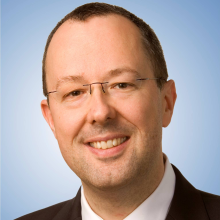Digital Infrastructure area of expertise
Digital infrastructures are created through the use of modern information and communication technologies (ICT) to manage complex tasks in countless application areas. They form a complex foundation of tangible physical components and intangible digital applications and services. As a closely networked system, they enable flexibility, reliability and sustainability in the energy sector, industry, trade, the healthcare system and the mobile society of the future.
These infrastructures encompass all hardware and software components and also include communication networks such as the internet or mobile phone networks. Many special systems and buildings such as data centres or base stations in mobile communications are also included. These infrastructures enable the almost complete and therefore comprehensive collection, transmission and processing of data in any application. In addition to established digital services such as e-mail, text or audio messages, they can also map complex digital ecosystems that we recognise as social media, online banking & trading or e-commerce platforms. As the backbone of the modern information society, they are crucial for its economic development, the emergence of innovations and global networking.
Subject areas
This is an excerpt of current topics that are continuously expanded and updated.
Virtual
-
Cloud computing and virtualisation
-
Software-Defined Networking (SDN)
-
Network Function Virtualisation (NFV)
-
Cybersecurity in digital infrastructures
-
Complex virtual networks (P2P)
Physical
-
Wireless communication networks
-
(Industrial) Internet of Things (IoT)
-
Systems for high-performance computing and quantum computing
-
Edge computing hardware
-
Neuromorphic hardware
Fields of application
Telecommunications
Internet & mobile networks
Financial services
Banking & payment systems
E-commerce and retail
Media and entertainment
Streaming services, digital content
Science and research
Data-intensive research, supercomputing
Social media and communication platforms
Transport and logistics
Healthcare
Electronic health records, telemedicine
Manufacturing and industry
Industry 4.0, Automation
Energy and utilities
Smart grids
Smart Cities
Agriculture
Precision agriculture, AgTech
Defence and security
Research questions and tasks
-
Scalability and performance
-
Resilience and fault tolerance
-
Artificial intelligence and automation
-
Future communication networks
-
Interoperability and standardisation
-
Ethical and social implications
-
Sustainable development and environmental compatibility
-
New hardware technologies and their integration (e.g. quantum computing)
-
Regulatory challenges
Director

> Theory of Distributed Systems
Head - Professor - Theory of Distributed Systems
Office: F2.326
Phone: +49 5251 60-6728
E-mail: scheideler@uni-paderborn.de
Manager

> Software Innovation Campus Paderborn (SICP)
Second Head - Research Associate - Vice Managing Director Software Innovation Lab, R&D Manager – Smart Systems
Office: ZM2.A.03.74
Phone: +49 5251 60-6823
Phone: +49 1788192000
E-mail: gsch@mail.uni-paderborn.de
E-mail: schomaker@sicp.de
University lecturers involved
Head - Professor
Office: P1.6.08.1
Phone: +49 5251 60-3002
E-mail: sybille.hellebrand@uni-paderborn.de
> Energy System Technologies (EST)
Head - Professor
Office: P6.2.073
Phone: +49 5251 60-2185
E-mail: henning.meschede@uni-paderborn.de
> Key research area Transformation and Education
Supernumerary Professor
Office: N5.304
Phone: +49 5251 60-2397
E-mail: gudrun.oevel@uni-paderborn.de
> Faculty of Computer Science, Electrical Engineering and Mathematics
Dean of Research - Professor
Office: O3.207
Phone: +49 5251 60-5250
E-mail: eim-forschungsdekan@lists.uni-paderborn.de
Head - Professor
Office: X1.101
Phone: +49 5251 60-5399
Phone: +49 5251 60-1735
E-mail: christian.plessl@uni-paderborn.de
> Signal & System Theory (SST)
Head - Professor
Office: P1.7.01.2
Phone: +49 5251 60-2213
E-mail: peter.schreier@sst.uni-paderborn.de
Head - Professor
Office: O3.149
Phone: +49 5251 60-5375
E-mail: lin.wang@uni-paderborn.de
